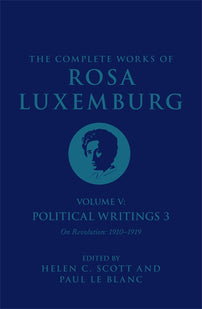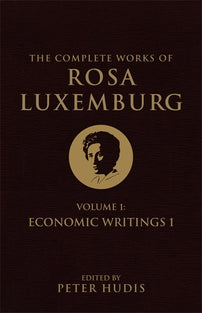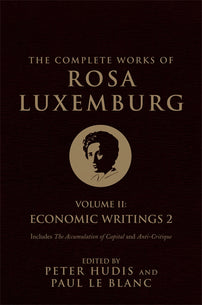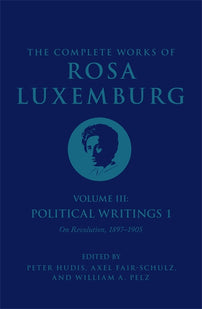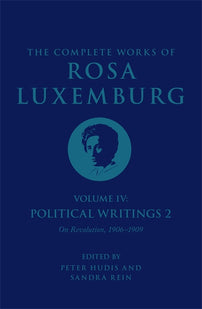To whom does Rosa Luxemburg belong?
The KPD transformed Rosa Luxemburg into a safely dead martyr, but her legacy continues to be a rich resource for ongoing global struggles.

In the early 1920s, Luxemburg was still a central figure in the pantheon of Marxist authorities in the German Communist movement, with contending factions citing her authority to advance their counterposed positions. This had changed by the mid-1920s, however, amid a campaign under the Communist International headed by Zinoviev to “Bolshevize” German Communism.
New KPD leader Ruth Fischer embraced Zinoviev’s call for a monolithic “centralized organization … carved out of stone that harmoniously and fraternally dispenses [with] the differences in their ranks. Bolshevism is Marxism in action, loyalty to the idea of the dictatorship of the proletariat, to the ideas of Leninism.” She infamously compared the ideas and influence of Rosa Luxemburg to “infusions of syphilis bacilli.” The mercurial and unreliable Fischer and her co-thinkers would soon be marginalized and driven out as Stalin took control of the Communist International, but Stalin also denounced Luxemburg’s ideas as “a semi-Menshevik hodge-podge” leading to “a number of very serious political and theoretical mistakes” and requiring “the very serious criticism” of the Bolsheviks of her time and of Communists in the 1930s.
Yet the KPD could not simply dispense with this icon of the early Communist cause. Stifling the revolutionary-democratic thrust and uncompromising critical-mindedness that were essential to who she was, they transformed Luxemburg into a safely dead martyr to be celebrated in “LLL festivals” from 1924 onward—commemorating Lenin-Liebknecht-Luxemburg— with Stalinist leader Ernest Thälmann proclaiming in 1932: “Rosa Luxemburg and the others belong to us,” and Wilhelm Pieck in 1951 (now a figurehead of the East German Communist dictatorship) repeating: “Rosa Luxemburg belongs to us!”
Among Marxist dissidents breaking away from what had become the Communist movement’s Stalinist mainstream, there was a strong sense that, in fact, Rosa Luxemburg was theirs. In 1930, Thalheimer instructed serious-minded activists that it was a mistake to counterpose Lenin to Luxemburg. “It is not a matter of Lenin or Luxemburg, but Lenin and Luxemburg,” he insisted.
The party bureaucracy perceives Lenin and Luxemburg as opposed to each other and thereby proves that it has not understood either. We counterpose to the bureaucracy not only the formal but also the spiritual bond of these two great revolutionary champions of the working class and their closest comrades in arms, their mutual supplementary features as revolutionary leaders, as practitioners and theoreticians.
In this spirit, Paul Frölich produced one of the finest biographies of Luxemburg, in 1939. And in 1954, Isaac Deutscher, in his classic biography of Trotsky, concluded: “Of all the personalities of European socialism, nobody was in origin, temperament, and political and literary gifts more akin to Trotsky than Rosa Luxemburg.”
Among the stalwarts of the Social Democratic Party, there seem to have been very mixed feelings. To such leaders as Ebert and Noske, of course, she was “bloody Rosa,” although for such former friends as Karl and Luise Kautsky she had become a well-meaning but disoriented idealist. For those on the party’s left fringe, such as ex-Communist Levi, she remained a heroic, principled, insightful, martyred comrade.
By 1974, a former leftist who became Social Democratic Party leader and chancellor of West Germany, Willy Brandt, felt sufficiently bold to place her face and name on a postage stamp. Many conservative Germans were shocked, but, as one journalist observed, buying and using the stamp provided “a way for those Germans—especially younger ones—who have leftist‐liberal political views to show them, without necessarily making a real political commitment.” Brandt himself praised Luxemburg for her view that “human progress was possible only by democratic development, not by paternalism but by participation of the masses whose spontaneous power and creative spirit she believed in.”
Arendt once commented that the romantic-revolutionary legend of Rosa Luxemburg—“vague, confused, inaccurate in nearly all details”—would periodically “come to life whenever a ‘New Left’ sprang into being.” She added sardonically:
Every New Left movement, when its moment came to change into the Old Left—usually when its members reached the age of forty—promptly buried its early enthusiasm for Rosa Luxemburg together with the dreams of youth; and since they had usually not bothered to read, let alone to understand, what she had to say, found it easy to dismiss her with all the patronizing philistinism of their newly acquired status.
At the start of the twenty-first century’s second decade, however, it has become clear that increasing numbers of activists are reaching out to connect with and learn from insights, analyses, and experiences related to what Rosa Luxemburg thought and did. More than a century after her murder, the crises and catastrophes of global capitalism continue to confirm her warning that the alternative to socialist revolution is capitalist barbarism. Young workers of our era face crises that have deep roots in the history of the twentieth century and before, and that threaten the survival of the very planet itself in new and acute ways. Some of the revived interest in Luxemburg’s legacy has shed light on those aspects of her thought that speak to environmental concerns:
Luxemburg could even be taken as a precocious thinker of the ecological questions that would later come to be known as eco-socialism or Marxist ecology. Her staunch defence of all living things and the land, against the violence exacted by the capitalist drive for accumulation and despoliation, seems to point in this direction.
In one of many outbreaks of mass action for climate justice, the Glasgow COP26 gathering of the international ruling class was met by protestors from all over the world calling for “System change! Not climate change!” while trash collectors and street cleaners walked out on strike in a call for respect and decent working conditions. Most of all, Luxemburg belongs to such insurgents of today and tomorrow.
— An edited excerpt from The Complete Works of Rosa Luxemburg Volume V
[book-strip index="1" style="buy"]
See more of The Complete Works of Rosa Luxemburg.
[book-strip index="2" style="buy"]
